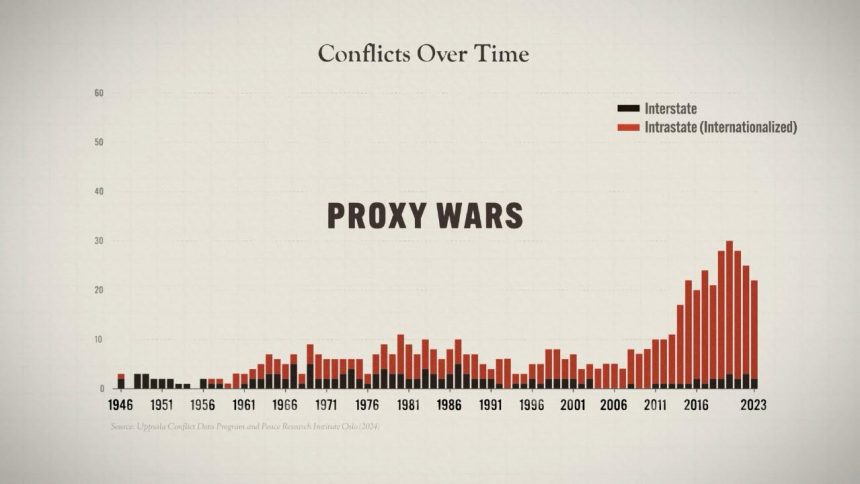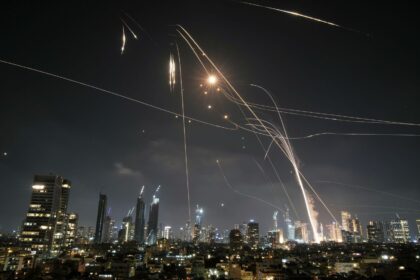The world has changed, and so has the nature of war. Long gone are the days when superpowers came head to head, sending thousands of soldiers onto the battlefield, creating havoc on earth and causing countless casualties. Modern warfare is different. The wars are being fought in a way that is untraditional. It resembles a game of chess rather than a direct confrontation. Every move is calculated, each step is analysed, and each strategy is executed from the shadows. Instead of marching their armies into the battlefields, the powerful nations now back a side in existing conflicts, providing it with money, weapons, and resources in order to gain influence. This is the new age of warfare, where wars are fought by superpowers without officially going to war. We have entered the era of proxy wars.
In proxy wars, powerful states indirectly fight each other by providing smaller states or non-state actors, which were involved in existing conflicts, with resources to fight so that these powerful states could increase their influence around the globe. This doesn’t only complicate the situation and exacerbate the conflict by the addition of such external actors but also prolong it. Wars that might have ended in years go on for decades, as seen in Afghanistan, where the intervention of the US and USSR fuelled the continuous cycle of violence and chaos.
This approach to warfare can be observed throughout history, as there are notable examples, one being the Byzantine Empire. Byzantines were famous for their strategy of first stoking animosity between enemy rival groups and then either supporting one side against the other or appearing as the peacemaker, acting as a neutral mediator to stop the war when their greater aims were achieved. Their strategy of indirect intervention was as infamous as Byzantine politics.
The same strategy was used by the French during the infamous “War of the Roses” between the English houses of York and Lancaster, where the French used similar tactics as a weak crown of England was in favour of the French. Similar tactics have also been used by the English as well, hence the Iraqi proverb, “If you see two fish in the river fighting, know that an Englishman has passed here.”
Similarly, the modern era has been no different, as there are various notable examples, such as that of the Cold War, which continued for decades between the United States and the Soviet Union after the Second World War and eventually ended when the Soviet Union was crushed under its own weight in 1991. After the Second World War, the world changed. With the dropping of the atomic bomb by the American side over Japan, it shaped the approach of the powerful nations towards armed conflicts, as it was clear that if wars continued to be fought by these nations directly, it would lead to unprecedented destruction, global instability, and the end of the world as we know it. Hence, these nations went for proxy wars. Among the notable battles during the Cold War is the Korean War, where the US was supporting the regime in South Korea, whereas the USSR supported the ideologically communist North Korea.
Post-Soviet states of affairs look no different, as there has been a surge in these proxy wars since the mid-20th century. The proxy war continued during the Georgian wars, which were fought by separatist groups supported by Russia to prevent alignment of the post-Soviet state with NATO and the West. Similarly, in the case of Syria and Lebanon, the non-state actors that are backed by rival states in the region have turned the whole country into a blazing battlefield. With the rise of nuclear deterrence and economic globalisation, direct wars are way too dangerous.
Various nations around the globe now possess nuclear capabilities, whose potential to cause massive destruction on an unimaginable scale has been witnessed during the Second World War. By avoiding direct confrontation, the nations can achieve their geopolitical aims while minimising the risks and costs that one has to pay in such wars.
The reason these nations go for such tactics rather than traditional direct wars is self-evident. This method seems to be more efficient and convenient for the bigger nations. And they don’t even have to risk the lives of their own civilians, as the people of those smaller nations involved in the conflict are dying. Another major reason for the surge in these operations is the deniability that these nations get, as they can deny their involvement in the conflict easily, and hence, they don’t get the public opinion against them.
The main victims of this whole situation are the civilians of these smaller, third-world countries which agree to fight the wars of these bigger nations and then are caught in the loop, where their fate is now in the hands of their external benefactors. These smaller nations then become mere puppets of the bigger nations and are not even allowed to make choices of their own.
Although this might seem to be ruthless, this approach seems sensible and strategic to the think tanks of the world, as it allows the powerful nations to pursue their interests indirectly throughout the globe, which otherwise would’ve been achieved through the power of guns and ammunition, which in the current scenario is no longer possible.
Proxy wars reshaped modern conflict by allowing these global powers to extend their influence while remaining in the shadows. Therefore, there has been an increase in proxy wars in recent years. Although this strategy might seem efficient, its consequences are devastating, especially for the nations which are directly involved. As the world keeps on modernising, we must recognise the importance of diplomatic solutions to these proxy wars that prioritise stability, peace, and harmony among the nations.












